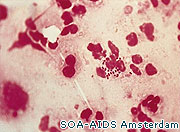A new strain of gonorrhoea that is resistant to antibiotics has been discovered by scientists.
The bacterial infection is one of the most common sexually transmitted infections, with thousands of Britons becoming infected each year.
Gonorrhoea can cause infertility, ectopic pregnancies and increased susceptibility to HIV.
Resistance
Dr Magnus Unemo, who led the team behind the discovery, described the find as “alarming” and the researchers warned that the strain is likely to become a “global threat to public health”.
Dr Unemo said: “Since antibiotics became the standard treatment for gonorrhoea in the 1940s, this bacterium has shown a remarkable capacity to develop resistance mechanisms to all drugs introduced to control it.”
He added: “While it is still too early to assess if this new strain has become widespread, the history of newly emergent resistance in the bacterium suggests that it may spread rapidly unless new drugs and effective treatment programs are developed.”
Dr Unemo’s disturbing findings were presented at the 19th conference of the International Society for Sexually Transmitted Disease Research in Quebec.
Infertility
Normal strains of gonorrhoea are treated with antibiotics. But if left untreated it can lead to serious and irreversible health complications in both women and men.
Scientists are now trying to combat the infection using different drugs.
In 2010 there were 418,598 new STI diagnoses made in England, a one per cent decrease from the previous year when 424,782 cases were diagnosed.

